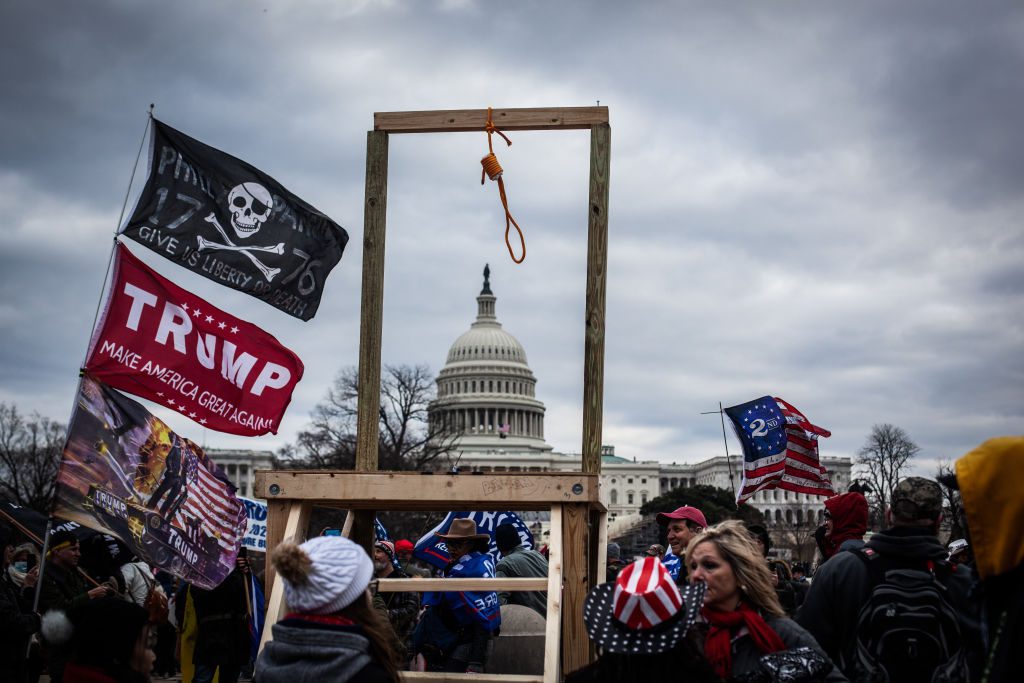Here’s a Traitor, There’s a Traitor

Last night, the United States Capitol Police announced the death of one of their own: Officer Brian Sicknick, a 12-year veteran of the force. Sicknick was killed during the insurrection at the Capitol building on Wednesday, and while we know little else for certain, it’s been widely reported that he was bludgeoned by a rioter with a fire extinguisher. His death is being investigated as a possible homicide. Let’s hope he’s given a state funeral.
It’s a curious thing because at least some of the gloriously pro-law-and-order red hats who showed up on Capitol Hill that dark day seemed to think Sicknick had betrayed his country. “Traitors!” they shouted at the Capitol Police, who had dared to do their jobs by resisting a lethal mob. Now they’re hot on the trail of another turncoat, Mike Pence, whom they’ve also labeled a “traitor” because he had the nerve to certify the next president of the United States as the next president of the United States. This comes after days of tile-wall thumb-scrawling by deranged psychopath Lin Wood about how any day now Pence was going to be tried for treason and executed. (Wood has since been banned from Twitter.)
That T-word, “traitor,” is everywhere these days, even in chillingly official contexts. Business Insider recently spoke with three foreign intelligence experts, one responsible for public safety in Paris and two counterintelligence officials in unnamed NATO countries, who characterized the insurrection as an attempted coup and concluded it appeared to have had support from within the American government. BI summarized the opinion of the French official this way: “they believed that an investigation would find that someone interfered with the deployment of additional federal law-enforcement officials on the perimeter of the Capitol complex.”
At the moment, that’s only conjecture based on circumstantial evidence, and thank God. But it nonetheless strikes at the heart of a portentous question: how in the hell was this allowed to happen? The Proud Boys have spilled blood in Washington streets multiple times just in the past two months. They’d been chattering on social media for days about bringing guns to D.C. Why did the police not take the threat more seriously? Why did they even, at one point, appear to allow the insurrectionists onto Capitol grounds? The answers will no doubt emerge in the coming months, albeit slowly. In the meantime, the mind lurches onto the blasted heath of banana republics and civil wars. Were powerful people in on the putsch? Could law enforcement become a sovereign faction of its own?
We’ve arrived at a very precarious moment in our history where one can ask such questions without being totally unhinged. This isn’t just because there was political violence—America has seen much of that—but because of the fraught circumstances surrounding it and the potential for more to come. And while it seems almost patronizing to say, the best thing the rest of us can do right now is to be careful how we talk to and about each other. I’m not trying to play speech police here: yesterday I counseled those who stormed the Capitol to go sodomize themselves with flagpoles, advice that a few helpful Facebook commenters observed was…mechanically challenging. But the word “traitor” goes further; it’s the language of war. And a war is exactly what many of those who ransacked the Capitol were seeking.
Politico campaign trail reporter Tim Alberta observed in a piece yesterday:
The first time I heard someone casually suggest an “imminent civil war,” on a reporting trip in January 2020, I shrugged it off. But then I heard it again. And again. Before long, it was perfectly routine. Everywhere I went, I heard people talk about stocking up on artillery. I heard people talk about hunting down cabals of politically connected pedophiles. I heard people talk about the irreconcilable differences that now divide this country. I heard people talk about the president, their president, being sabotaged by a “deep state” of evil Beltway bureaucrats who want to end their way of life. I heard people talk about a time approaching when they would need to take matters into their own hands.
And so they did. The thing to do now is to not give it to them, to refuse to adopt their wartime mindset. Trump voters aren’t traitors. Mike Pence isn’t either. Those in Congress who objected to Joe Biden’s certification might be many things—dishonest, cynical, prioritizing ambition over the common good—but they aren’t seditious. Historian Antony Beevor wrote of the years prior to the Spanish Civil War: “Utterly irresponsible rhetoric and the debasement of political discourse fanned the flames of resentment and created fear.” Historian Bruce Catton wrote of the year 1856: “Instead of trying to convert one’s opponents it was simpler just to denounce them, no matter what unmeasured denunciation might lead to.” Not just actions but words will matter in the days to come, and expanding martial terminology beyond its technical definitions, indulging those most extreme and lurid scenarios without evidence, will only make our situation more perilous.
There is, of course, one exception. Those who attacked the Capitol building have indeed betrayed their country. May they be met not with Twitter hyperbole but with the lettered justice of the law.
Comments